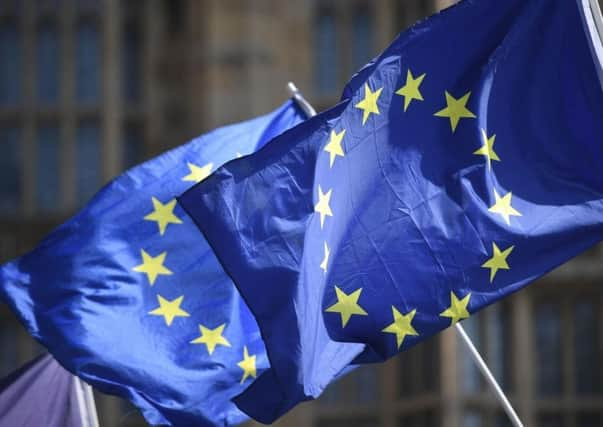UK GDP growth forecasts revised down due to Brexit uncertainties


The EY ITEM Club’s Autumn Forecast expects UK GDP to grow by 1.3 per cent in 2018, downgraded from 1.4 per cent and 1.6 per cent in the summer and spring forecasts respectively.
EY expects GDP growth of 1.5 per cent in 2019, downgraded from the 1.6 per cent growth it was forecasting in the summer and 1.7 per cent in spring.
Advertisement
Hide AdAdvertisement
Hide AdThe forecast downgrade reflects increased uncertainties such as the risk of the UK leaving the EU without a deal in March 2019, faltering consumer purchasing power and loss of economic momentum in the eurozone over the first half of 2018.


Howard Archer, chief economic advisor to the EY ITEM Club, said: “Our forecast is based on the assumption that the UK and EU will ultimately agree a Brexit transition arrangement that will help limit the shock to businesses and the economy.
“However, heightened uncertainties in the run-up to and the aftermath of the UK’s exit could fuel business and consumer caution. This is a significant factor leading us to trim our GDP forecasts for 2018 and 2019.
“Should the UK leave the EU in March 2019 without any deal, the near-term growth outlook could be significantly weaker. Trade could be substantially affected as barriers, both tariff and non-tariff, kick in.
Advertisement
Hide AdAdvertisement
Hide Ad“A likely sharp drop in the pound could provide help to UK exporters, but it would also push up businesses’ costs.
“Consumer price inflation would also likely increase thereby weighing down on households’ purchasing power.
“However, it is also possible that the growth pattern could be distorted in late-2018 and 2019 if concerns about supply disruptions in the event of ‘no-deal’ cause companies to stockpile materials and finished products.
“This could be reinforced if consumers panic buy. This scenario would be liable to boost growth in late-2018 and early-2019 but weigh down on growth thereafter.”
Advertisement
Hide AdAdvertisement
Hide AdThe warning over Brexit comes off the back of business sentiment on Britain leaving the EU shifting.
According to business advisory firm FTI Consulting’s Brexit in the Boardroom survey, 56 per cent of businesses now believe it is better for their company for the UK to remain in the EU, with 44 per cent believing it would be better for the UK to leave.
The survey gauged the opinion of over 2,000 companies from France, Germany, Spain and the UK.
In comparison, last year the survey found that 51 per cent felt it would be better for the UK to leave the bloc.
Advertisement
Hide AdAdvertisement
Hide AdThe biggest swing was in Germany, 12 per cent followed by the UK, 8 per cent change, Spain, 6 per cent, and France, 4 per cent.
John Maloney, head of FTI Consulting’s Brexit taskforce, said: ‘With only 6 months to go, and a critical European Council meeting this week, business has clearly decided it will not get the clarity or the certainty it needs to enable it to prepare for the longer term.
“The impact on individual businesses could be huge, suggesting research and development, jobs and commercial investment will be affected.
“Company Boards are taking the appropriate action to mitigate the risk. How disruptive this will be will only become apparent in the coming months as we all wait to see if the political process can deliver an agreeable deal for both sides.”
Advertisement
Hide AdAdvertisement
Hide AdThe Brexit in the Boardroom survey found that 78 per cent of European business believe Brexit will now happen, up from 76 per cent in 2017. However, with only six months to go, business preparedness has hardly changed from December 2017, 22 per cent of businesses said they were concerned but not prepared.
Companies across Europe will need help to adjust post-Brexit
Brexit uncertainity isn’t just weighing on British business leaders with companies in mainland Europe being warned to make preparations for Britain’s departure from the EU.
Hans Hack, FTI Consulting Brexit taskforce member and former Dutch diplomat, said: ‘‘The UK looks most exposed, but it would be wrong to assume that European business are immune from the consequences of a no-deal scenario. Relative optimism in France contrasts with significant drops in Germany and Spain. A wait and see approach isn’t an option anymore.
“While it’s not too late for companies to influence what remains a fluid political process, preparation is now key. Companies will need help as they begin to adjust to the new commercial landscape.”